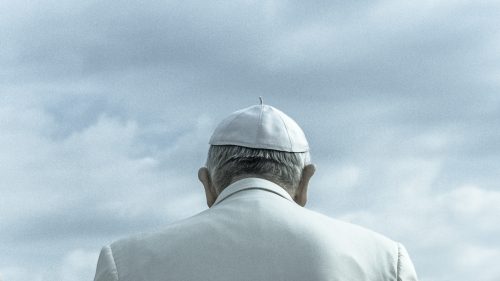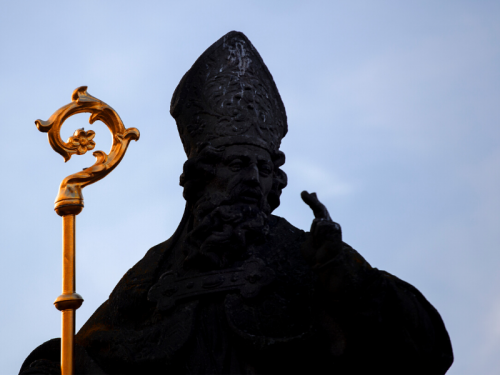This week, I received a question from a new member of Bayside Church on the subject of Papal succession. Papal, or Apostolic, succession is the Roman Catholic teaching “that each pope is the successor to the Apostle Peter who was chosen by Jesus as the rock on which the church was to be built.”
The person who asked the question has come from a Roman Catholic background. Regarding Papal Succession, she wrote, “That’s the big thing for me that always made me believe the Catholic Church is the true church. Jesus gave the keys to Peter. Then Linus was the 2nd Pope. Peter would have known of Linus. And then the handover goes down through the years ending up at Pope Francis.” She then asked, “Do you believe that is what Jesus meant to happen when He handed over the keys? That it would be handed down to each new Pope?”
It’s a great question and one I will seek to answer in this blog. I should add here that I’m not writing this to criticise the Catholic Church. All Christian churches have differences over doctrine, but we all hold to the Christian faith’s vital truths. I am not anti-Catholic, and I do not criticise other churches.
Peter in Rome
The Apostle Peter likely ended his days in the city of Rome. In 1 Peter 5:13, he wrote, “She who is in Babylon, chosen together with you, sends you her greetings, and so does my son Mark.” “She” refers to the church. Babylon denotes the city of Rome from where Peter (and Silas and Mark) were writing the letter. Rome was often referred to as Babylon in the Jewish and Christian literature of the time. The Christians who stayed in Rome were greeting those who had fled for their lives under Nero’s persecution. Peter, Silas, and Mark were leading the church in Rome.
There is no mention in the Bible of Peter being Pope. There is no mention of Peter being Bishop of Rome until the middle to the late second century. The words Pope and pontiff do not appear in the Bible.
Peter died in Rome at about the same time as Paul. Peter was crucified as attested to by the apostle John in his gospel, “Very truly I tell you, when you were younger you dressed yourself and went where you wanted; but when you are old you will stretch out your hands, and someone else will dress you and lead you where you do not want to go.” Jesus said this to indicate the kind of death by which Peter would glorify God” (John 21:18-19). Some church tradition teaches that Peter deemed himself to be unworthy to be crucified in the same way as Jesus, and so he asked to be hung on a cross upside down.
In the same year (68 AD), Linus was appointed overseer of the church in Rome (Linus is mentioned in 2 Tim 4:21) and was well known to Paul and Peter.
The Church’s Centre
The Christian church didn’t become centrally organised until it became “legal” under Constantine in 313. Nicene Christianity* then became the State Religion in the Roman empire with the Edict of Thessalonica in 380, under Emperor Theodosius I.
The first-century church was first based in Jerusalem and was led by James, the brother of Jesus (Acts 12:17; 15:13; 21:18). The Gentile church was centred in Antioch (Acts 13). While the church at Rome was significant in the first century, it didn’t become the church’s headquarters until much later. The first use of the title Pope was the middle of the tenth century. The first use of the name Roman Catholic was in 1208 and the Vatican was built in 1929. The word Catholic, wasn’t used until the early second century. Up to then, followers of Jesus were called Christians (Acts 11:26). Collectively, the church was called The Way (Acts 9:2).
Pope Peter?
So, what does it mean that Jesus gave Peter the Keys of the Kingdom? Simply that Peter would be the one who “unlocked” the truth of Jesus the Messiah first to the Jews (Acts 2), and then to the Gentiles (Acts 10).
Was Jesus declaring that Peter would be the Pope who would hand the keys down to each new Pope?
The events are recorded in Matthew 16:13-19. Jesus wanted to know who people thought he was. The disciples let him know: “Some say John the Baptist; others, Elijah; still others, Jeremiah or one of the prophets.” Jesus was using this question to discover what he really wanted to know, “who do you say that I am?” Peter answered, “You are the Messiah, the Son of the living God!” At this point, Jesus declared Peter blessed because the revelation came straight from the Father in heaven. “And I also say to you that you are Peter, and on this rock, I will build My church, and the forces of Hades will not overpower it. I will give you the keys of the kingdom of heaven, and whatever you bind on earth is already bound in heaven, and whatever you loose on earth is already loosed in heaven.”
In the Greek language, Jesus is using a play on the words “Peter” and “Rock” ~ “You are Petros, and on this petra, I will build My church.” Petros is a small stone or pebble, while Petra is an enormous mass of rock. It’s like Jesus was saying to Peter, “You’re a spot on a little stone. And on this massive rock of the revelation of who I am, I will build my church.” The church is built on the fact that Jesus is the Messiah, the Son of the living God! Jesus is the foundation stone of the church (1 Cor. 3:11). The church is built on Jesus Christ, not on a succession of popes.
* Nicene Christianity is a set of Christian doctrinal traditions that reflect the Nicene Creed, formulated at the First Council of Nicaea in AD 325 and amended at the First Council of Constantinople in AD 381.




